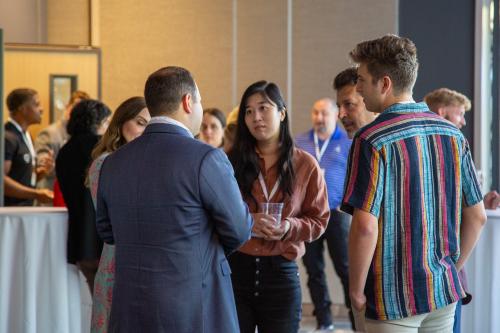

“I want to stay in the biotech cluster here in RTP,” said Dave Ousterout, PhD ’14, “even though everyone wants me to go to Boston, Toronto, Philly, Chicago.”
Ousterout—cofounder of Locus Biosciences—was addressing fellow members of the Duke Entrepreneurial Leaders Network (ELN) at their recent inaugural in-person meeting. ELN, which was founded two years ago and consists of 30 members across the U.S., is a select cohort of alumni interested in launching or joining an innovation-driven startup.
“This group understands the tremendous potential of science and technology to transform society,” said Jamie Jones, director of Duke Innovation & Entrepreneurship (I&E). “By building new ventures, they’re not only delivering solutions to large-scale problems, but also transforming their communities.”
Prior to panels convening local investors and entrepreneurs, the ELN members spent the morning getting to know each other. “I was inspired by the amazing work that those in my cohort are doing in their respective spaces, and I look forward to further engagement with the ELN program,” said Mario Salazar MBA ’22, founder of Attain Foods.
“I enjoyed a chance to spend an afternoon with local entrepreneurs across industries, roles within the ecosystem, and experience,” Ousterout said. “Investing some extra time was well worth it to connect on a deeper level, dive into topics of common interest, and share and discuss our unique journeys.”
Exploring the Startup Funding Landscape
In a panel moderated by Jones, Abhi Muthiyan, CTO of Base Healthcare; Padowithz Alce, Duke Angel Network member and founding partner of AI Patent Law; and Krista Covey, President of First Flight Venture Center, shared their perspectives on the current startup funding landscape and how today’s economic environment is impacting fundraising.
Panelist Insights
Padowithz Alce: “[In this economic climate] there are going to be VCs who want to give less to get more. But it’s also a time of opportunity—during the last recession, companies like Plaid and Coinbase came out.”
Krista Covey: The [startups] I’ve seen that have been more successful definitely have the traction and have been reaching out quite a bit to broaden their investor networks. From the entrepreneurs I’ve seen, [the downturn] hasn’t been detrimental. They’re scrappy, they’re nimble, and as long as they have customers and validation, they’re going to be okay.
Abhi Muthiyan: “In 2008, I got laid off—and half of other people did too. Lots of people were willing to work for not very much. That’s not the case now.”
Krista Covey: “I’ve seen a lot more folks looking for strategics—strategic relationships, people who can manufacture or supply their solution.”
Abhi Muthiyan: “Outside of biotech what I’ve seen more often is crowdfunding. I’ve seen companies raise a couple of million dollars through crowdfunding, and that’s becoming a more viable alternative for product and tech—users will fund you if they like your product.”
Padowithz Alce: “The teams who have a hacker or someone who can get you to market, those teams are going to win. Some teams don’t have a CTO who can actually do anything, so they have to outsource a lot of work, and those contractors are expensive. VCs and investors like me, I’m going to look at team dynamics a little harder in this timeframe.”
Krista Covey: “Something to think about as you’re growing your team is the culture. Think about creating an environment where folks will have better offers, but because they love the team, the mission, and what they’re doing, and feel like they have a legacy, they’re less likely to leave.”
Success Stories From Duke Spin-Outs

A subsequent session, “Success Stories of Duke Spinouts,” featured Sujay Kansagra and Matt Becker, who shared lessons learned from working with Duke’s Office for Translation & Commercialization (OTC) to launch a company. Robin Rasor, Associate Vice President for Translation & Commercialization, spoke to the technology licensing and commercialization process at Duke, the current IP portfolio, and ways to engage with a university spin out.
Kansagra and Becker represent very different stages of the entrepreneurial journey, with Kansagra—a pediatric neurosurgeon—preparing the launch of a product to help teach children better sleep patterns, and Becker—a professor whose lab works at the interface of chemistry, organic materials, and medicine—having been issued 18 U.S. and 43 foreign patents, been awarded three SBIR grants, and formed three companies under the umbrella of Viamer Biosciences.
Becker joked that he’d come from “the school of hard knocks” when it came to entrepreneurship, addressing the importance of finding the right people and selecting the right board.
Kansagra said with a grin that if someone had told him five years earlier he’d be on the panel, he would have laughed. Describing his approach to the daunting prospect of starting a business, he expressed gratitude for OTC’s many resources and said, “I know this isn’t going to be something I run for years and years, so I’ve surrounded myself with people who know a lot more than me.”
“While OTC’s main mission is translating Duke innovations into the commercial marketplace, we are also passionate about our entrepreneurial Duke students, alumni, and faculty and are therefore thrilled to partner with Duke I&E to facilitate these connections through the ELN and other programs,” Rasor said. “Identification and nurturing of entrepreneurial talent is incredibly important to the future of our region and our startups.”